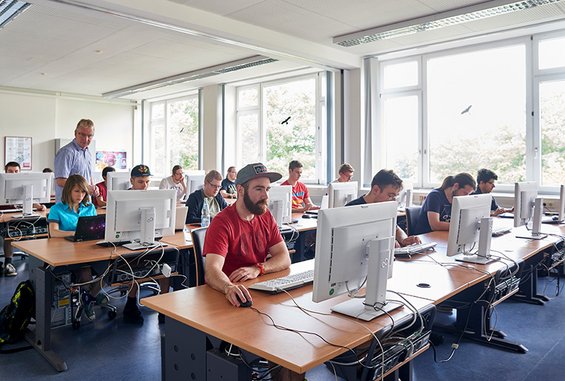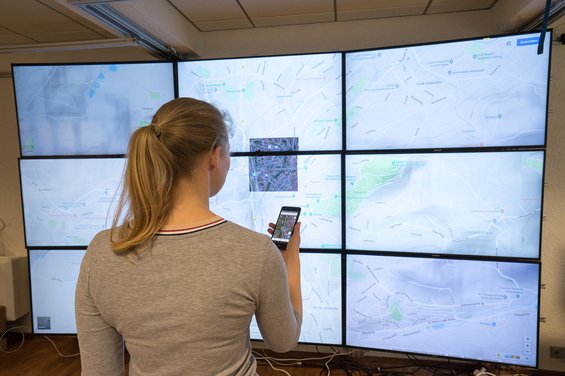
Computer Science
In A Nutshell
Profile
The computer science program at Coburg University is designed specifically for the requirements of professional IT practice. It conveys wide-ranging technical computer science skills that give graduates access to companies in diverse industries. In addition, the program also focuses on the development of non-technical skills (soft skills) to develop the character of the students.
A distinctive feature of the computer science program at Coburg University is the EVELIN project. It investigates the best didactic methods to teach students computer science skills (in particular software development skills). It develops and tests methods that allow computer scientists to learn new subjects in self-directed study and stay on top of projects.
Specific study projects with partners in industry and international contacts with global software companies also provide early contacts in the practical world and allow students to gain international and intercultural experiences.
Students particularly appreciate the support they receive at the start of the program, the competence of their teachers, the personal contact, and the practical nature of the program.
Structure of the Program
The first program segment (semester 1-4) covers the following content:
- Fundamental principles of computer science and mathematics
- Core subjects of computer science, e.g. algorithms and data structures, programming, software engineering, data base and operating systems, networks, micro-computer technology
In the third and fourth semesters, students supplement their compulsory subjects with the subject of their choice from the electives catalog.
The required internship semester takes place in the fifth semester.
In the sixth and seventh semester, all content can be selected from an electives catalog. This way, students can choose their focus area depending on their own strengths and interests.
Students spend about 20-25 hours per week in lectures, exercises, and practical training at the university. In addition, they have to invest additional time in studying and work independently to deepen their understanding of the contents. The examinations are spread evenly throughout the entire duration of the program. This gives students a good overview of their performance and study success at all times.


Freely selectable Program Content
We offer subjects for different topic areas in computer science, e.g.:
Software Technologies
This covers the design and creation of software and software-intensive systems. The spectrum of subjects covers all innovative software technologies and technologies for the design of software development processes.
This includes:
- Web technologies
- Development of software for large, complex systems
- Cryptography and IT security
Embedded Systems
Large computer systems consist of complex hardware and software. This area of specialization addresses the optimal combination of hardware and software components.
Possible areas of application are:
- Development of hardware and software e.g. for cars (security and driver assistance systems), hardware engineering
- Mobile computing, such as programming mobile devices (mobile phones, iPhones, wireless sensors)
Business IT
This subject addresses modern information systems that support businesses in their business processes. This requires both business administration knowledge (e.g. cost and performance accounting, marketing and sales) and computer science technologies.
Possible applications include:
- Use of standard business software
- IT management
- Production and logistics
Computer Graphics and Computer Vision
In computer graphics, methods for the computer-aided generation of images are taught and studied. Computer vision studies how information can be extracted from images (like 3D models of surroundings). Fundamental algorithms and data structures and of computer graphics and computer vision are covered and solutions are developed and studied in the following areas:
- Modeling, processing and storage of complex scenes
- Interactive computer graphics
- Fundamentals of machine vision
- Parallel processing on graphics cards
Curriculum and Examination Regulations
The [module plan]* shows the distribution of the subjects over the seven-semester program. The [module manual] provides an overview of the contents of the program. The [study and examination regulations]* form the legal basis for the study program. Contact your academic advisor Prof. Dr. Dieter Wißmann concerning the content of the program.
*only available in german at the moment
Job Perspectives

Computer scientists can find diverse and challenging work at hardware and software producers, but also at institutional IT users, such as industrial and trade companies, banks, insurances, and public agencies.
Activities include:
- Software and hardware development for products
- System and application development (analysis and implementation) in technical but also commercial and administrative fields
- System analysis and IT organization
- Care and operation of complex IT systems and computer networks (e.g. in data centers)
- IT consulting for the optimization of business processes and supplier chains
- Sale of IT-based solutions
Computer scientists in the field of software technologies work in some of the following areas:
- System analysis and IT organization
- System and application development for technical, commercial, and administrative solutions
- Development of software-based products, like web developments
- Support for and operation of complex IT systems and computer networks
Computer scientists in the subject area of embedded systems work in the:
- Automotive industry: Development of embedded systems for engine control, vehicle handling, and car infotainment
- Production industry: Development of systems and devices for the automation, monitoring, and quality assurance of production processes
- Medical technology: Development of diverse devices for diagnosis and therapy
Business IT specialists work at the interface between business administration and computer science, e.g. for the following:
- Planning, development, and maintenance of operational information and communication systems
- IT consulting and sales of complex IT solutions that require technical knowledge as well as communication and negotiation skills.
Computer scientists in the subject area of computer graphics and computer vision work in the computer games, medical technology, or automotive industries as:
- Software developers
- Software architects
- Data scientists
- Algorithm developers
Master's degree
After completing the Bachelor’s degree, good graduates have the possibility of obtaining further qualifications with a Master's degree. For this purpose, Coburg University offers the Master’s programs in Computer Science and Electrical Engineering and Information Technology. These programs continue directly after the Bachelor’s degree.
Application and Admission Requirements
Here you can find all the important information about evaluating your school-leaving certificates and learning German in order to start a bachelor program at the University of Coburg.
Since the program is taught in German, you also have to prove your knowledge in German before the start of studies (level C1/C2).
Status: December 2019.
Further and current informations can also be found on the German website of this course.
